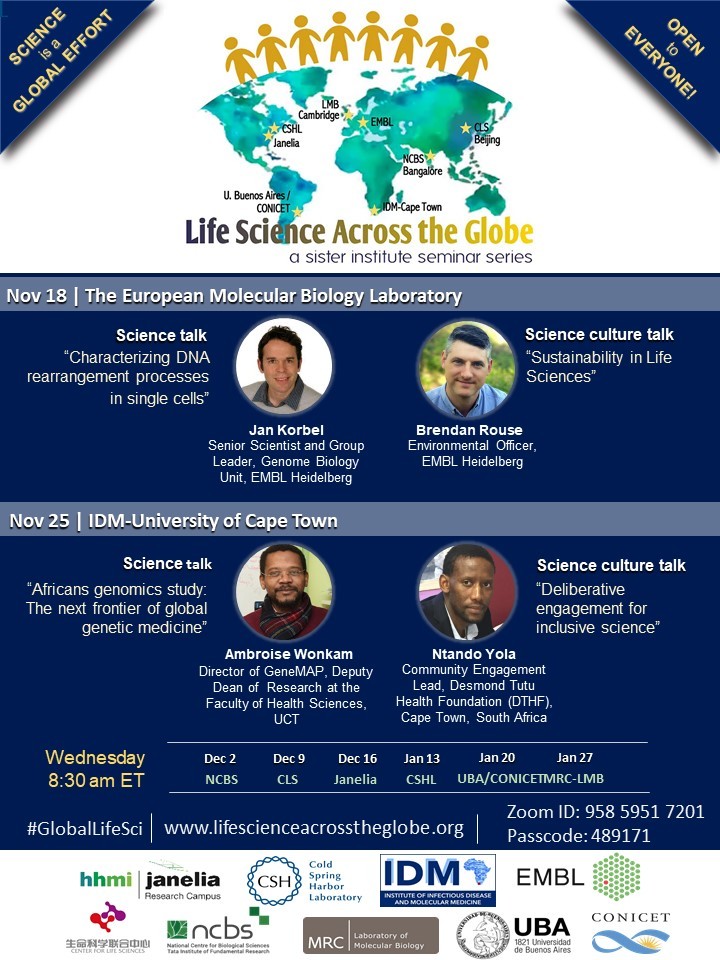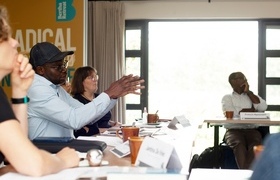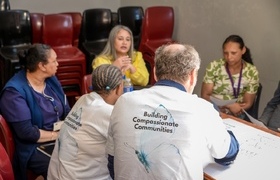Delivering innovation and inclusivity in science
20 November 2020 | Story Nobhongo Gxolo. Read time 5 min.
University of Cape Town researchers, Professor Ambroise Wonkam, director of Genetic Medicine of African Populations (GeneMAP) based at the Division of Human Genetics and Ntando Yola, the Community Engagement Lead at the Desmond Tutu Health Foundation will bring their unique perspectives together at a Science-meets-Science Culture talk that is open to all, Life Science Across the Globe. The session will be hosted on Wednesday.
The LSAG seminar series, which shares science virtually, brings together academics from Janelia, the research campus of the Howard Hughes Medical Institute and seven leading research institutes from around the world. Now in its 22nd edition, the Institute of Infectious Disease and Molecular Medicine take centre stage.
These researchers are both based at the IDM, with its home at the university’s Faculty of Health Sciences. Yola’s work is in HIV while Wonkam’s focuses on genetics. And as different as their approaches and aims are, the practicability of the work resonates with the communities they serve.
On the 25th of November Yola’s talk titled: Deliberative Engagement for Inclusive Science will share insights on how community engagement in general health and in HIV and TB clinical trials is important – while highlighting the benefits for effective public health solutions.
He says the talk should serve as a “reminder of the important role communities play as partners in the science that involves them – for the benefit of broader society. Community Engagement therefore shouldn’t be relegated as a nice thing to have, but an inclusive exercise where everyone in the value chain of research plays their role and none is more superior than the other.”
Yola hopes to challenge the online audience and encourage it to constantly rethink how the practice of community engagement is prioritised and adapted to move with communities as partners, and the ultimate beneficiaries of research.
With his talk Africans genomics study: The next frontier of global genetic medicine based on a paper he recently co-authored in Nature Reviews Genetics, Wonkam will discuss the significance of the continent being scientifically proven and recognised as the cradle of humankind. Acknowledgement which establishes that the Anatomical Modern Human originated in Africa. A recognition of the continent as the birthplace of all humanity.
“There are however concerns that the scientific imperative associated with African genomic variation will not necessarily translate to enhancing genetic medicine implementation for African communities. Therefore, questions on how best to advance equity principles as part of big data governance in genomics still need to be urgently addressed,” said Wonkam.
This is why an African perspective is crucial – because learnings from these populations are often universally applicable and can be extrapolated the world over.
Yola adds, “Science designed for communities without their understanding, participation and support cannot sustainably solve the problems it intends to. They should be part of the solutions – no matter how inconvenient this may seem at times.”
Join the Zoom conversation here: https://hhmi.zoom.us/j/95859517201?pwd=b2pha2xhWWk4a1BteWJrcStVUWdOQT09.
Zoom ID: 958 5951 7201
Passcode: 489171
Wednesday 25th November at 15:30 CAT
 This work is licensed under a Creative Commons Attribution-NoDerivatives 4.0 International License.
This work is licensed under a Creative Commons Attribution-NoDerivatives 4.0 International License.
Please view the republishing articles page for more information.










